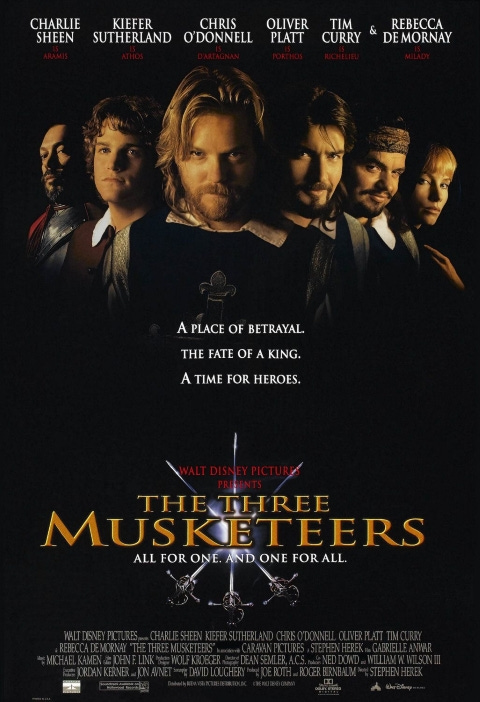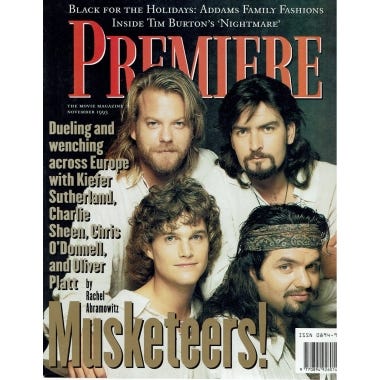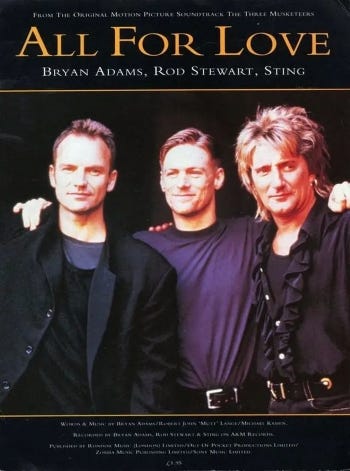Alexandre Dumas’ novel The Three Musketeers was originally published in 1844. By most accounts, its first screen adaptation arrived nearly 60 years later, a short, presumably lost French version released in 1903. Since then, a decade hasn’t gone by without at least one, and usually two or three, attempts to find a fresh take on this well-worn material. Surprisingly, it wasn’t until 1993 that Disney tried their hand at the Dumas classic (unless you count the 1936 Silly Symphonies short Three Blind Mouseketeers and you probably shouldn’t). If they had, there’s little doubt that it would have looked a lot different than the energetic and “cool” version they produced in the ‘90s.
Walt had certainly brushed up against the swashbuckler genre in his live-action days. But movies like The Story Of Robin Hood And His Merrie Men, The Sword And The Rose and Rob Roy, The Highland Rogue were essentially costume dramas with a light dusting of swordplay, very traditional and more than a little boring. To be fair, the genre was a little bit past its prime by the time Walt got down to seriously making live-action pictures in the 1950s. Still, his efforts had done little if anything to rejuvenate it.
Nobody was exactly clamoring for a new version of The Three Musketeers in 1993, either. That didn’t prevent three, count ‘em, three different studios from announcing they were all developing a Musketeers project at roughly the same time. In addition to Disney, both Columbia and TriStar had plans for their own adaptations. This kind of thing happens in Hollywood sometimes, resulting in waves of body-switch movies or dueling Truman Capote biopics. Occasionally, a studio will take a long hard look at the cards they’re holding, fold, and walk away from the table. That’s exactly what happened to TriStar, who never did get to make their version, which was supposed to have been geared toward adults and faithful to the book.
But things got a little heated between Disney and Columbia after the Mouse House acquired a pitch by screenwriter David Loughery, who’d worked on such films as Dreamscape, Star Trek V: The Final Frontier and Passenger 57. The problem was that Columbia had already been in talks with Loughery to write their version. Not surprisingly, things threatened to get litigious. Ultimately, the two studios settled the matter out of court and Columbia decided to bag the whole project, leaving Disney with the last Musketeers standing.
The studio had a long wish list of hot young actors they pursued for roles in the film, including Brendan Fraser, Brad Pitt and future Disney Legends Johnny Depp and Robert Downey Jr. (sit with that thought for a moment). Winona Ryder signed on to play Milady de Winter but soon dropped out. Eventually, the studio settled on Young Guns co-stars Charlie Sheen and Kiefer Sutherland as Aramis and Athos, Sutherland’s Flatliners co-star Oliver Platt as Porthos, Chris O’Donnell (who had just appeared in Scent Of A Woman with Al Pacino) as D’Artagnan and Rebecca De Mornay as Milady.
A number of heavy-hitters also turned down the role of the film’s villain, Cardinal Richelieu. That list included Pacino himself and Gary Oldman. Instead, the part went to Tim Curry, who probably should have been at the top of the list all along. Cardinal Richelieu may not be the role Tim Curry was born to play but it’s hard to imagine he wouldn’t have sooner or later.
To direct, Disney hired Stephen Herek. They’d been very happy with his work on The Mighty Ducks and were eager to keep him in the fold. Honestly, I’m not entirely sure how your work on a contemporary hockey rink in Minnesota qualifies you for 17th Century France. Perhaps he’d simply proven that if he could handle one Sheen brother, he could handle them all.
The movie also went through a revolving door of producers. Originally, the studio teamed up with Andrew G. Vajna’s Cinergi Pictures. But Vajna didn’t like Disney’s casting decisions and bailed. Next, Jon Avnet and Jordan Kerner, the producers of The Mighty Ducks, came aboard. They too left the project, preferring to focus on their sequel to The Mighty Ducks and When A Man Loves A Woman for Touchstone. Finally, they made a deal with Joe Roth and Roger Birnbaum, who had just left their positions at 20th Century Fox to form Caravan Pictures. The Three Musketeers would be the first of many coproductions with Caravan.
Herek’s movie bears a superficial resemblance to Dumas’ novel. It hits the broad strokes, kind of like a Classics Illustrated adaptation, but the historical backdrop so central to the book takes a seat waaaaay in the back. I shudder to think what kind of grades a student would get if they tried to fake their way through reading the book by watching this version. Probably only slightly better than one who tried the same trick after eating a 3 Musketeers candy bar.
The movie instead takes its cues from other movies, two then-recent releases in particular. One is the aforementioned Young Guns with its cast of handsome young movie stars playing dress up and fooling around in an established genre. In some ways, The Three Musketeers feels like a logical extension of the two Young Guns movies. It isn’t a huge leap to go from westerns, shooting guns and riding around on horses, to swashbucklers, fighting with swords and, yep, riding around on horses.
The other primary point of reference is Kevin Costner’s Robin Hood, Prince Of Thieves. Costner’s movie had been a huge hit in the summer of 1991, despite some terrible reviews. Disney’s movie never gets as dark or violent as Costner’s but it attempts to follow its blueprint with action set-pieces and making no effort to persuade the audience that its stars are anything but American. American actors always have a harder time in movies like this than British ones. The dialogue sounds unnatural and they never seem truly at home. Still, these Musketeers appear to be having a lot of fun and that goes a long way.
No one was going to win any awards for this picture, although Chris O’Donnell came close after being nominated for a Razzie as Worst Supporting Actor (he “lost” to Woody Harrelson in Indecent Proposal). But the movie is surprisingly well cast. Oliver Platt and, of course, Tim Curry are particular standouts but everyone has their moments. Even O’Donnell is just fine as the eager and bright-eyed D’Artagnan. They elevate what could have been a pedestrian adaptation to the level of an entertaining rainy-day matinee. That might not be the highest praise but sometimes, you have to take a movie at face value and accept that it could have been so much worse.
Disney was shameless in their attempts to recreate the success of Costner’s Robin Hood, going so far as to poach Bryan Adams to reteam with composer Michael Kamen and super-producer Mutt Lange on a new song. The team had a huge hit with their Robin Hood song, “(Everything I Do) I Do It For You”, spending seven weeks at the top of the Billboard Hot 100 and winning a Grammy. In keeping with the Three Musketeers motif, they recruited Rod Stewart and Sting to perform “All For Love” with Adams. The song didn’t reach quite the same level of success as its predecessor. It also hit number one but was only there for three weeks and didn’t take home any awards or nominations. Maybe some cash-grabs are just too blatant.
The studio had extremely high hopes for The Three Musketeers, reporting that the film had received the highest ever test scores from preview audiences. They moved its release date up to November 12, 1993, and almost doubled the number of screens they’d planned to open on. Those plans may have been a tad optimistic. The film opened at number one, earning over $10 million. That was fine, right around average back then, but if they’d hoped for a Jurassic Park-size blockbuster, this wasn’t it. It ended up earning over $53 million in the US and doing a little better overseas. By any definition, it was a hit.
It was not, however, a hit with most critics who saw through Disney’s transparent efforts at manufacturing a movie-style product. A handful accepted it and enjoyed it for what it was, including Leonard Maltin and Gene Siskel. The episode of Siskel & Ebert featuring the film is a gold mine for fans of the bickering critics. They couldn’t seem to agree on anything that week except for Jane Campion’s The Piano.
Although it isn’t widely remembered these days, The Three Musketeers was a fairly big swing for Disney in 1993. Instead of focusing on proven genres aimed at the relatively small family audience, they went for a wide-appeal blockbuster with a cast of famous faces not typically associated with the studio. And even though it was a hit, it wasn’t a megahit, which probably explains why it’s going to be a long time before we see anything remotely like it again in this column. Disney will go back to being Disney and leave the four-quadrant hits to the grownups over at Touchstone, leaving The Three Musketeers as another path not taken by the studio.
VERDICT: I had enough fun with this one that I’ll go Disney Plus.







I thought this movie was an absolute blast, and have seen it a few times since the theater. Reading this makes me want to watch it again….
No mention of the 2004 Mickey-Donald-Goofy "Three Musketeers" team-up? I realize that you avoid direct-to-video mouse-house products here, with good reason, usually. But this one is pretty good, and it would have been interesting to see how, and if, it grew from, or was influenced by its live-action, in-house cousin. Especially since this is exactly the sort of thing you usually track so well for us, too. Good review, otherwise.